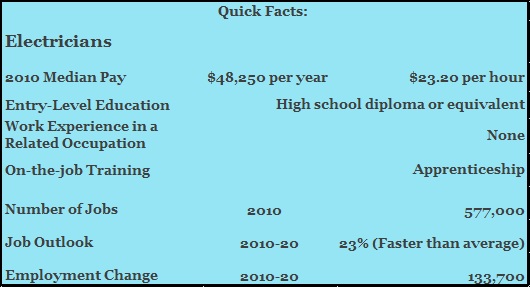Training programs of all types are available for people; on-line, night classes, two-year, four-year and correspondence courses to name a few. Narrowing down these option is something that I struggle with as I work with my clients, and I am considered a professional. To do this for yourself without professional help, it is important to gain knowledge about the potential jobs and educational paths.
I believe there needs to be a system in place that allows students in high school (or those looking at going back to school for re-training), to adequately research careers and the costs involved. According to any news source, college loan debt is at a disastrous level.
Three initial steps should be considered when doing research on careers, and in any order:
A) Job Availability in Career Path, Following Completion of Training Program
In order to get an adequate feel for how employable your degree path will make you, it is important to look at the current economic conditions of an industry and future growth potential. This information is provided for free by the government, through the Bureau of Labor Statistics.
For instance, here's a job listing for Electrician and all of the information that it includes:
B) Career Research to Determine Fit for Interests, Salary Requirements, Abilities and Job Setting
Many people are attracted to jobs based on salary potential, but they often find that their interests do not always fall in line with those occupations. Some examples that I have heard from many people include Salesman and Attorney. In these occupations, stress and long hours can outweigh the potential at high earnings.
1) Informational Interviews
To find out more about a job, the best thing to do is talk to somebody who currently works in that field. One method I have done with Veterans to help with their choice of careers, is to have them call businesses and ask to talk to somebody in their field of choice. It may require some patience to get somebody on the phone, but people usually enjoy talking about their job . Firsthand knowledge is invaluable and you will likely learn more about the profession then you can find on the internet. You can gain inside knowledge for hiring practices, preferred colleges, and career outlook. Also creating networking connections that can be revisited once you graduate.
Here's a link that helps explain the process: http://www.quintcareers.com/informational_interviewing.html
2) Site Visits
A little tougher then just talking to somebody on the telephone, but you can get into a workplace and witness a job first-hand. To do this, contact businesses directly that offer occupations like the one you are hoping to find out about and just ask if you can tour the facility. Often businesses cater to students in ways they would not with other people, so tell the company that you are a student and you wish to see how a business operates.
3) Internships and Internet Research
If you are serious about a career, try an unpaid internship with a company. These are often offered during the summer around school breaks, and can lead to future employment if everything works out. Alternatively, if none of these options seem possible for you, check out websites that detail occupational options. One website offered by the Federal Government is Career InfoNet and links up with various other labor market data sources to provide a range of detailed information.
Other websites for Career Research:
http://careerkids.com/careers/ This site is youth-oriented and offers videos for some occupations
http://www.insidecareerinfo.com/ This site offers first-hand reviews of 285 different jobs
http://www.thecareerproject.org/ This site offers first-hand Q&A's with people in occupations
C) Discover Training Costs and Requirements
The variance in costs of training programs is extremely large, ranging from apprenticeships to four year private colleges. The cost for college seems to be ever-increasing, as does the resulting student loan debt. It would be assumed that salaries for college graduates are increasing at a similar rate, but that is not always the case. The college you attend does not determine tuition based on potential salary with your degree. It is increasingly important to make your college decisions with all of these factors in mind.
Here's a chart from CollegeBoard.org and their 2011 Trend in College Pricing:
Without a doubt, the four year college experience is going to cost a lot of money. There is cheaper options in terms of four year colleges, and that should be a factor when deciding when and where to earn your education.
There's a ton more to discuss on each of these topics and they will probably be broken down further in future posts. Please add any questions or suggestions in the comment section below.
-Jesse



No comments:
Post a Comment